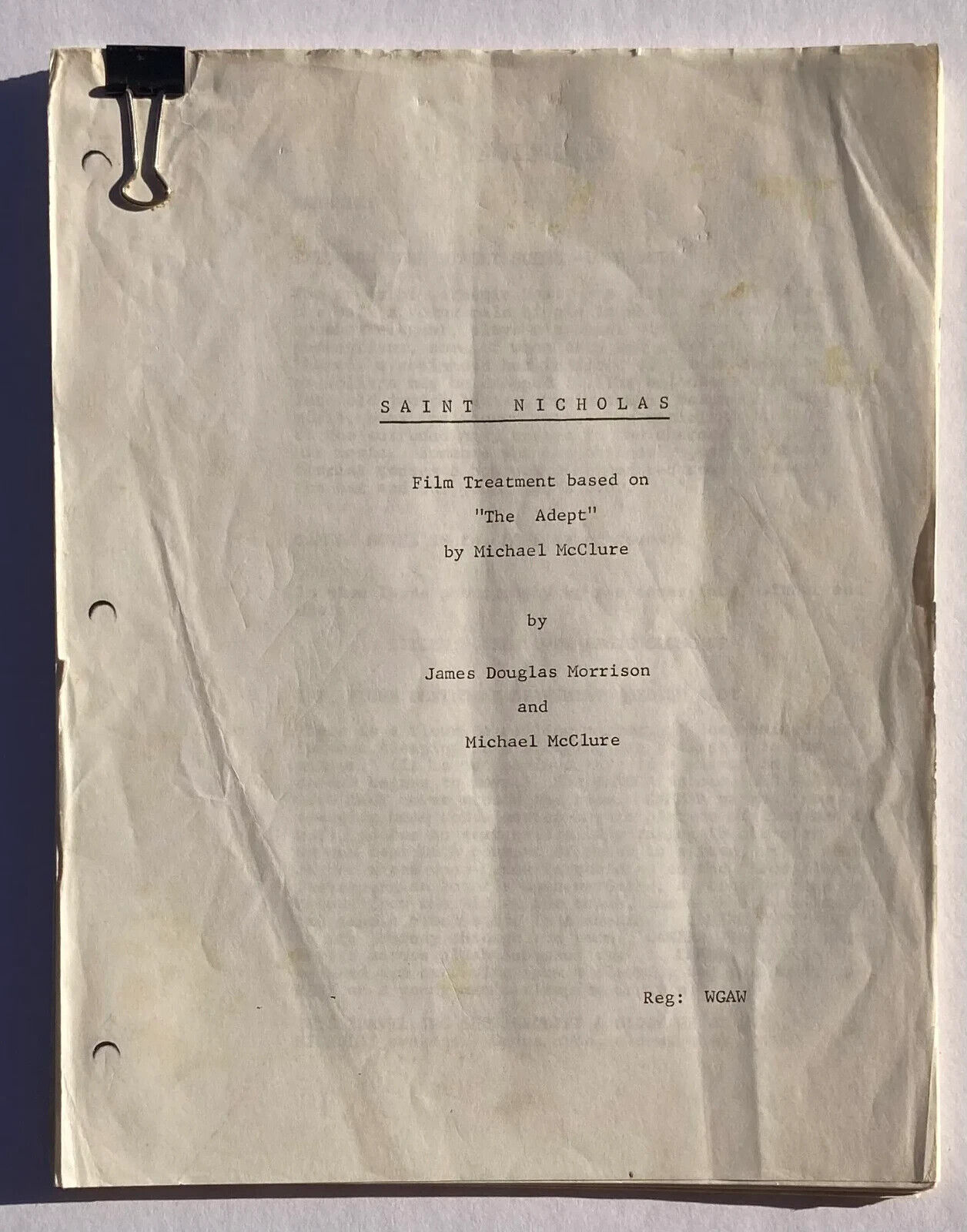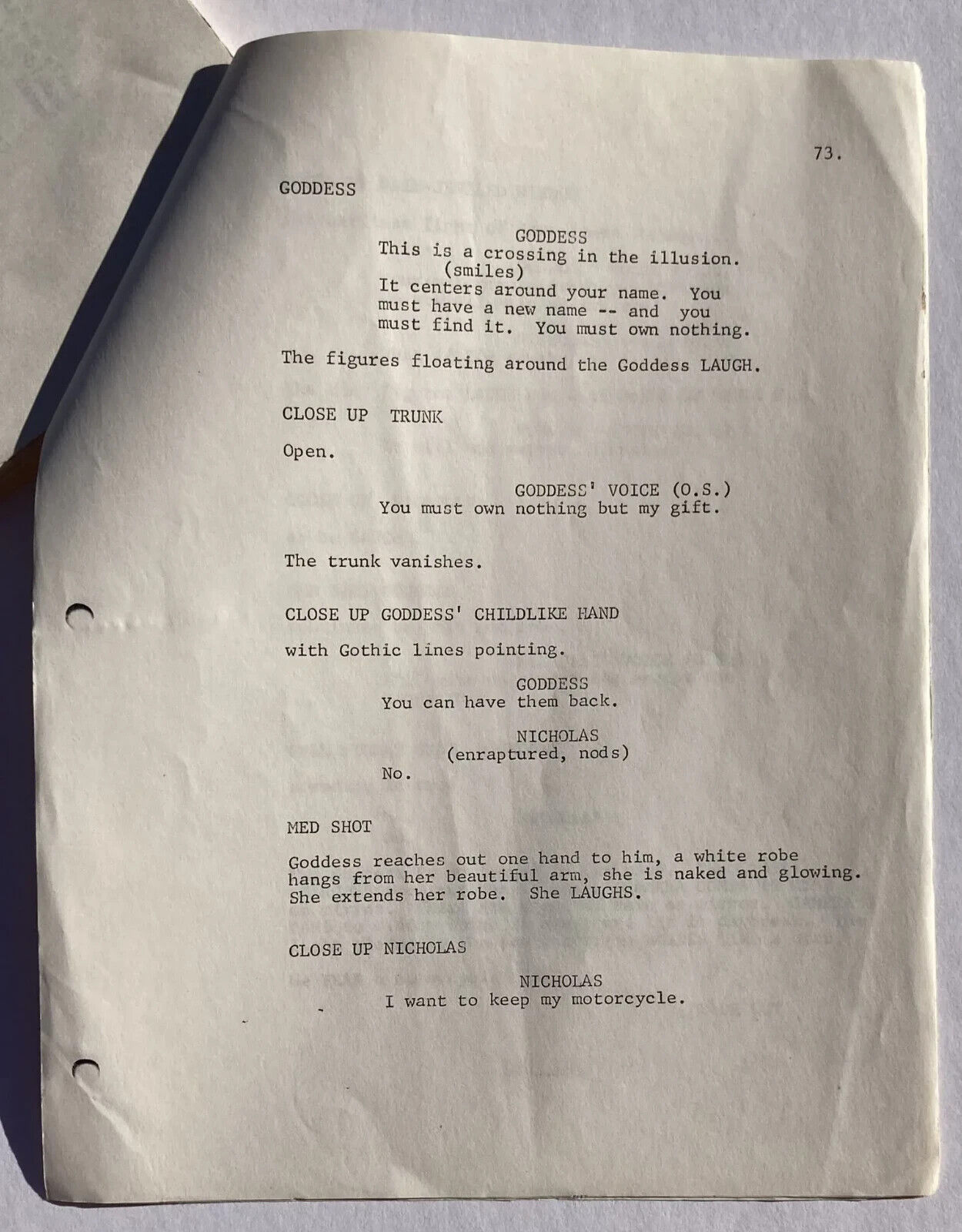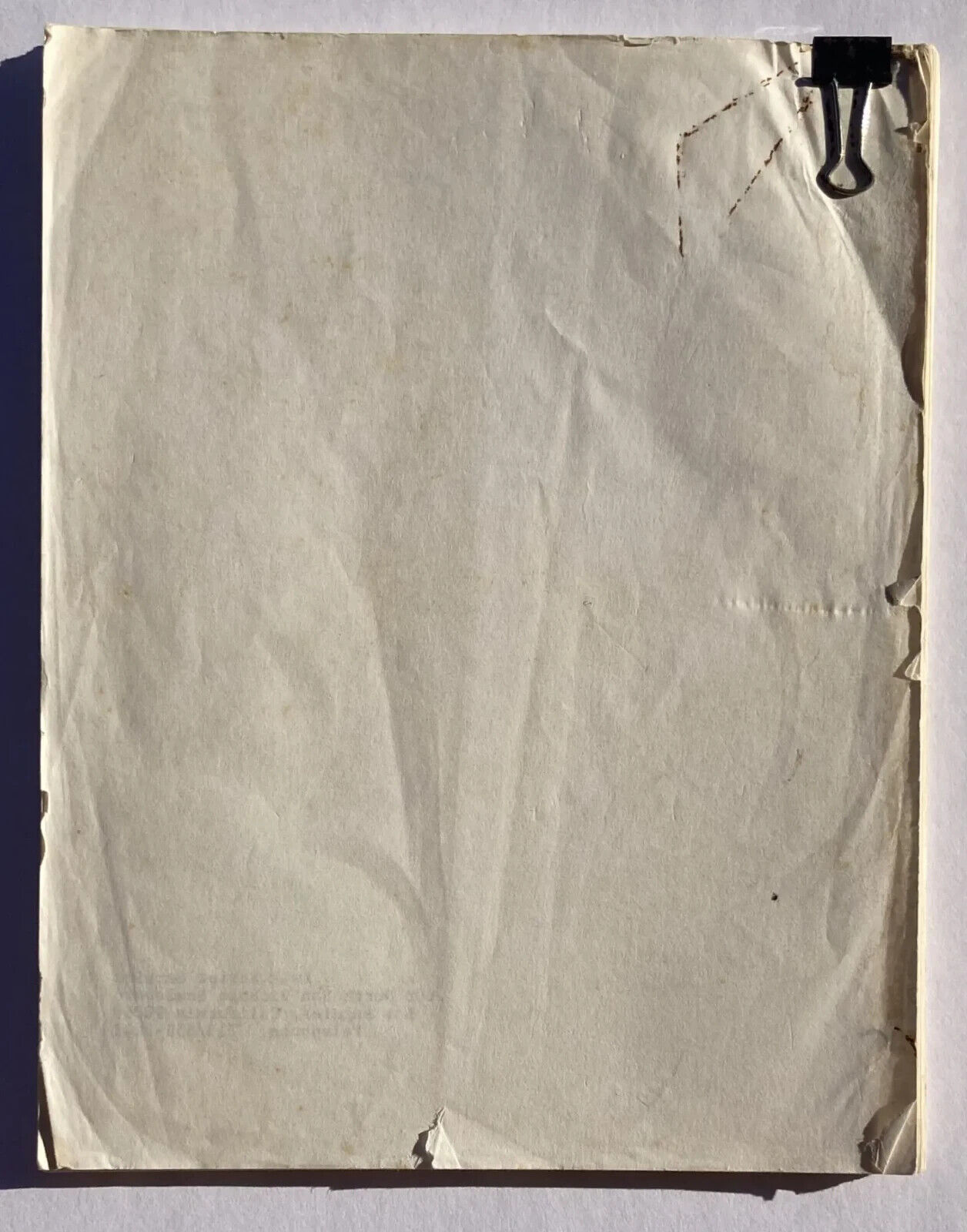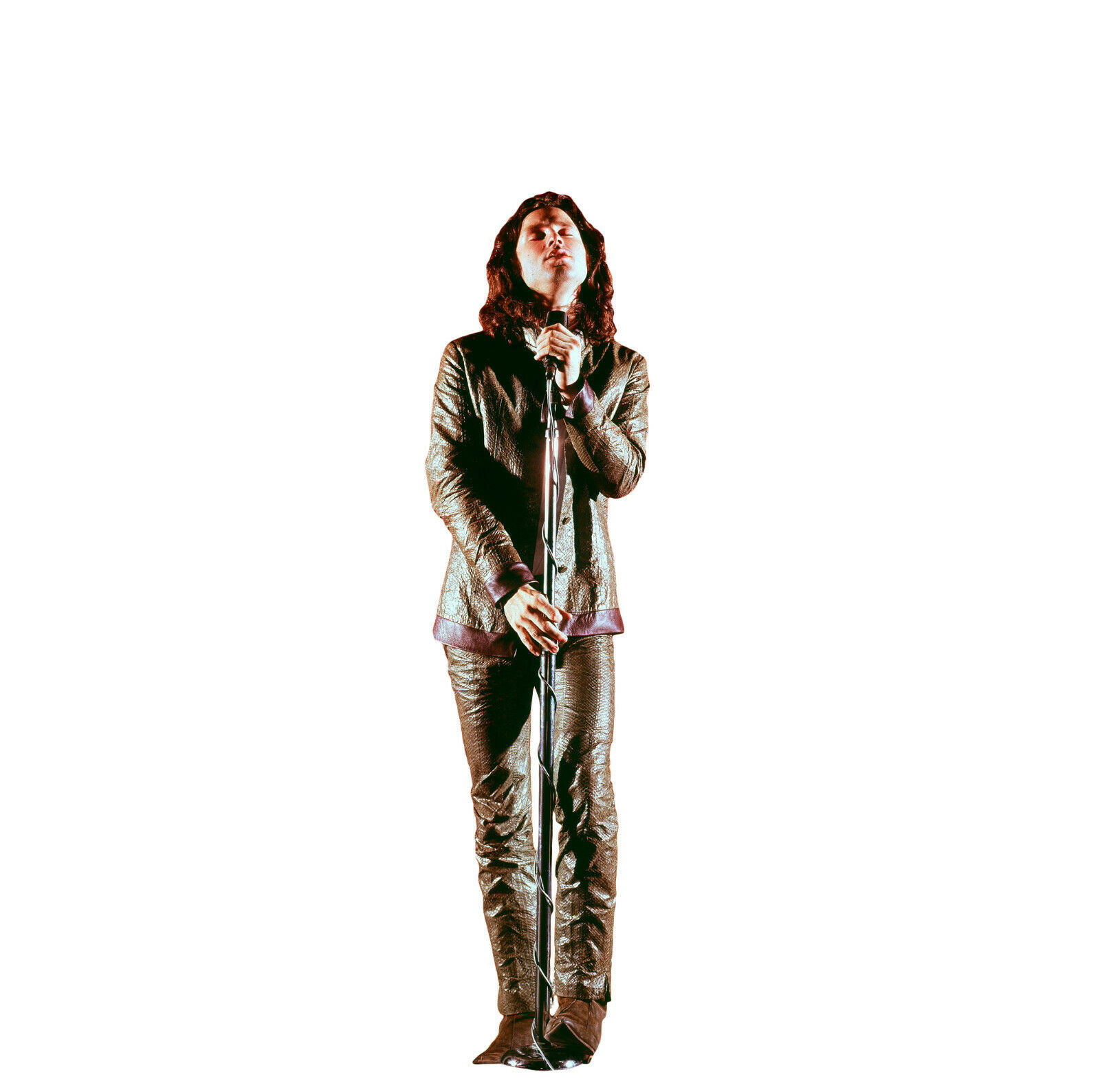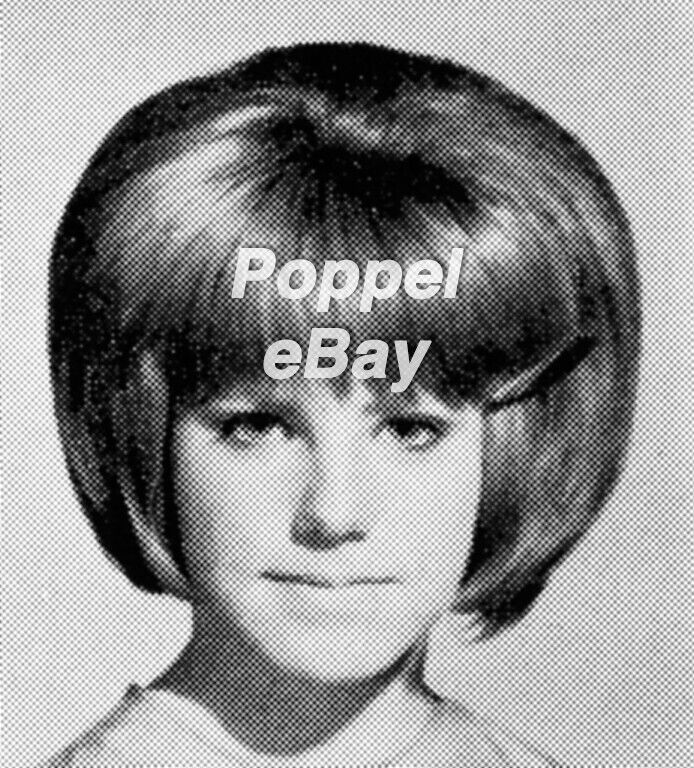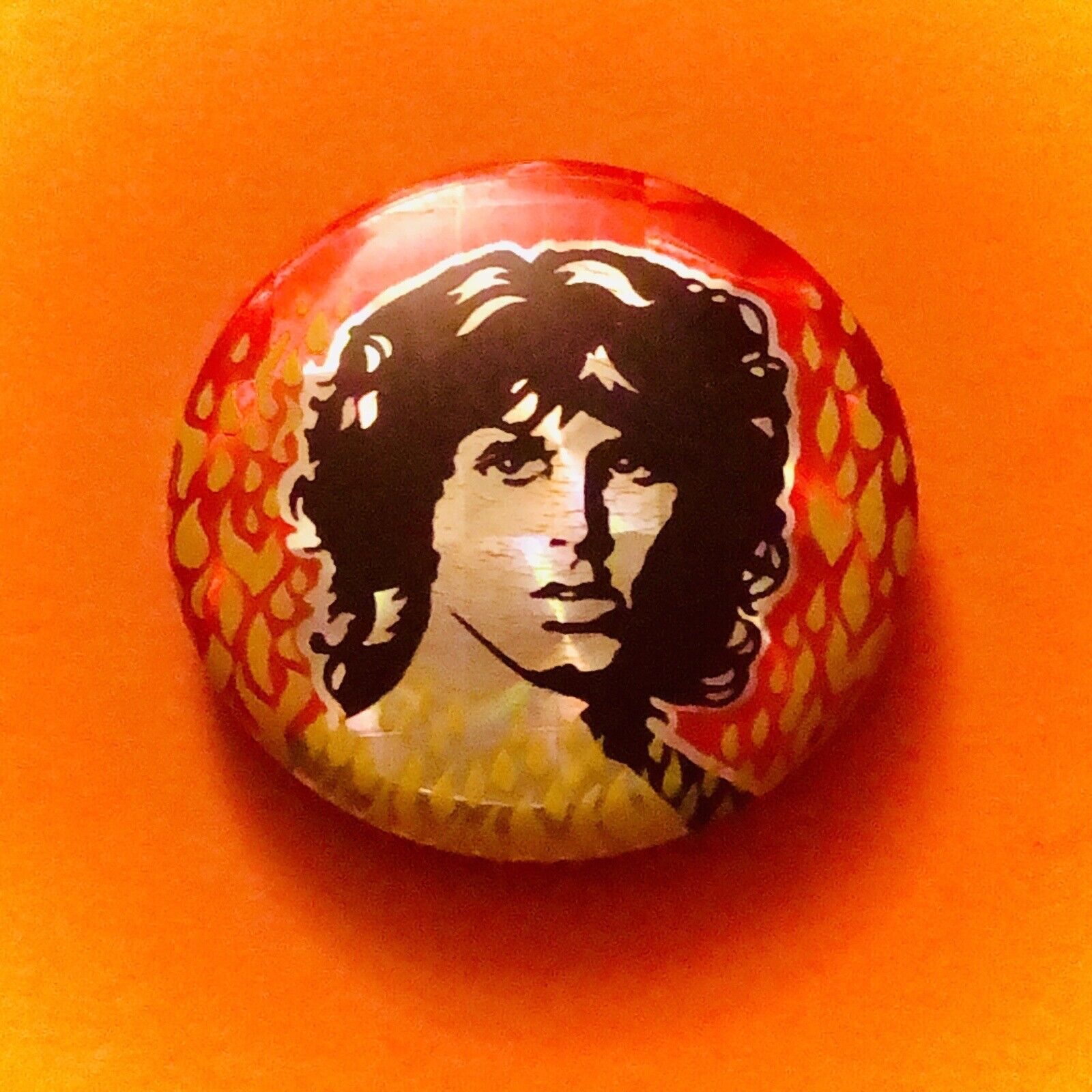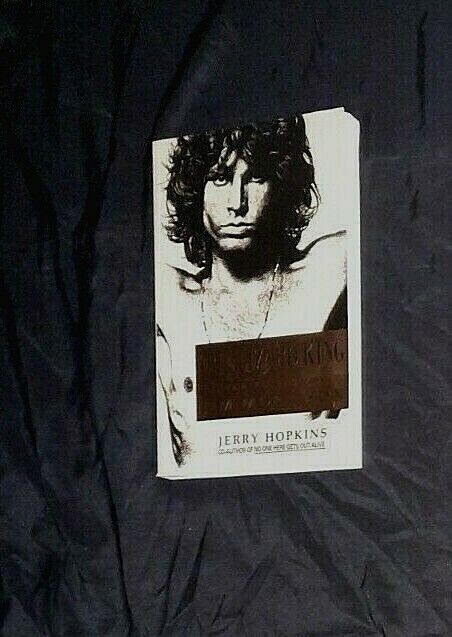-40%
JIM MORRISON & Michael McClure UNPUBLISHED SCREENPLAY St. Nicholas EX-D.SUGERMAN
$ 5279.47
- Description
- Size Guide
Description
One of only three known copies of the unpublished Jim Morrison/Michael McClure film scriptSaint Nicholas
(with Morrison writing as 'James Douglas Morrison,' the name he used with his privately printed poetry books.)
In June 1969, Morrison and legendary Beat poet Michael McClure collaborated on a film script based on McClure's unpublished novel,
The Adept
. Using an advance on the script, they rented office space at the 9000 Sunset Building on the Sunset Strip, where they collaborated on the screenplay. Until now, only two copies of this legendary 'lost' script have surfaced: one in the collection of the Bancroft Library at the University of California, Berkeley, and one from a film producer's estate that we sold many years ago. This copy matches the Bancroft's exactly; it's 74 pages, printed by Kwik Script Service, and dated 1971.
This film script is from the collection of longtime Doors associate and manager Danny Sugerman (1954-2005.) Danny Sugerman met and began working for The Doors at the remarkably young age of 13, first handling their fan mail and organizing their clippings and scrapbook, and later writing press releases. He was close to Jim Morrison, and after Morrison’s death, became Ray Manzarek’s manager, and then manager of The Doors, overseeing their catalog releases and legacy.
Sugerman wrote several books about Jim Morrison and The Doors, including the bestselling Morrison biography
No One Here Gets Out Alive
(co-written with Jerry Hopkins),
The Doors: The Illustrated History
, and his Doors-heavy autobiography
Wonderland Avenue
. He was also a consultant to Oliver Stone for the film
The Doors
.
We acquired this directly from Danny Sugerman’s widow, Fawn Hall; her signed letter of authenticity is included, as is Recordmecca’s written lifetime guarantee of authenticity.
The script is in very good condition, with some creasing, and rust staining from the clip holding it together on the first and last pages.
Morrison discussed
Saint Nicholas
in the following interview with Howard Smith (Los Angeles Nov 6 1969)
Howard: Are you gonna be writing films though? You have anything in the works?
Jim: Um, yeah. Probably the… If I do anything in films it will probably be this script called
Saint Nicholas
that Michael McClure and I wrote based on his novel
The Adept
which hasn’t been published yet. It’s a contemporary story about a couple of dope dealers that go to the desert to make a score and if I, if I do anything that’ll probably be the first project.
Howard: Are you gonna appear in it also?
Jim: Um…probably.
Howard: It sort of sounds like the beginning of
Easy Rider.
Jim: Yeah, I know but there’s nothing I can do about it. This… this story was written before
Easy Rider
was made, you know and it’s just superficial similarities. It’s… I know people are gonna, you know call attention to that, but I don’t know what to do about it. It’s…it’s very similar to
Easy Rider
in its superficial aspects. Do you know, I read in Daily Variety yesterday…
Easy Rider
was made for about 5,000 dollars and the estimated gross so far... 50 to 60 million dollars! He said in a religious hushed tone… 50 to 60 million dollars. That’s quite a profit margin, m’dear.
Howard: A lot of bad movies have made that much money too.
Jim: Yeah but they… but they usually cost 10 or 12 million dollars to make. This was… this is like a… breaks precedents all over the place because it’s the first essentially independent, low budget feature to really clean up in the old marketplace. It’s unusual. It’s gonna… it’s gonna open the scene up for a lot of people.
From:
Break On Through: The Life and Death of Jim Morrison by James Riordan and Jerry Prochnick:
(June 1969) – Jim began working with Michael McClure on several different projects including a screenplay which Morrison described this way: “It’s called
The Adept
and it is based on one of Michael’s unpublished novels… It reminds me of
The Treasure of Sierra Madre
. It’s about three cats in search of a psychic treasure… a young guy named Nicholas who lives in New York… a friend of his named Rourke who’s a revolutionary-turned-neo-capitalist, and they both have long hair… They fly to Mexico and meet up with a black cat named Derner. They venture out on the desert to meet a half-breed border guard to make a score.”
From:
Morrison "A Feast Of Friends", by Frank Lisciandro / The Snakeskin Jacket Chapter: a remembrance of Jim by Michael McClure:
"We decided against talking to [film producer Elliott] Kastner about
The Beard
. In the meantime, Jim had read my new manuscript, my novel
The Adept.
Jim loved
The Beard
and wanted to play Billy The Kid in
The Beard
, which I thought would be beautiful. But when he read
The Adept
he said, "Let's do this instead." I said, "Now that's an idea."
Kastner said, "What about
The Beard
?" Jim said, "We've changed our mind, we want to do a new project based on Michael's novel
The Adept
." Then Jim told the story of the novel with a vivid sense of drama, great detail and full recall of what happens in it. That's complex since the novel is basically about sensory experience and it's a mystical novel... an adventure novel about an anarchist, visionary idealist coke dealer who is an outlaw motorcycle rider. Sort of a sociopath anarchist, artist, idealist, dope dealer, back in the days of the sixties when those were real people. The characters in it are based on people I knew.
Anyway Jim pitched the entire novel to Kastner and Kastner was interested... Certainly Jim's intellectual abilities were stunning. I was pleased to be working with him and at that point I was just beginning to know Jim and Pam. It was a demonstration of Jim's power to recall the novel in its totality, and explain the novel to Kastner, and change it into a film as he told it, and to make it more visual for Kastner. I was impressed.
Finally Kastner passed on it. Said, "No." We were still intent on doing the novel as a film, and we were determined that we would write the script and Jim would star in it. In the meantime Jim had made contact with a man named Bill Belasco who wanted to produce it. So we talked with Bill, and we were pretty convinced that Bill could handle it. At that point Jim and I made arrangements to start writing a film script together.
Belasco rented an office for us on the top floor of the Scam Building. Where is it, 9000 Sunset Strip? That big glass-fronted building in the middle of the Strip. We were on the eleventh or twelfth story, in a corner office with a couple of rooms.
Jim and I made a deal with ourselves, no drinking during the day. No drinking before work, one drink at noon, and no drinking till six o'clock, which was critical for both of us.
We came in with copies of my novel and we got there by ten o'clock every morning. And Jim was never a late.
He was there every morning. I was there every morning. When we first began, Jim, because he'd been to UCLA film school, said, "We're going to have to do a treatment before we do the script." I said, "I don't think we're going to have to Jim." Unfortunately we should have done the treatment.
We started working directly from the novel, just adapting the book, as it was. We got a fair distance into it, and then at that point, we were not doing what we wanted to do. Jim and I had seen many things together, both in Los Angeles and London, that we wanted to put in the script. Jim'd say, "You remember that violinist we saw in Sloane Square, man? The kid with the rag hat?" And I'd say, "Yeah." "I want him right here, playing down below the street while the protagonist of
The Adept
comes to the window and looks down." I'd say, "Okay man."
Then I'd remind him of something or other and say, "Let's have that." So we started adding everything we wanted to have in the script. It became voluminous. And we were getting ideas rapidly. Jim would shoot some of the dialogue and twist the plot to me or we'd go back to the book. We realized that what we were doing was that we were sitting there rapping back and forth to each other, so we hired a secretary. She came in at ten o'clock everyday too, and we started dictating to her. Jim and I would do that all day for, I don't know, three or four weeks.
We worked hard on it in such a fashion that we ended up with a script that was about the size of Moby Dick. I mean it was a couple hundred pages, and more, typed up. Then we realized what we had could not be shown to Belasco as a professional script. In the middle of the night one night Jim cut it down to a ninety page script and he missed, he missed the point. He cut it down to the right length of a script and we had it typed up and gave it to Belasco. But I didn't like what it ended up being, because what we had originally created was a redwood tree. We created a huge script, instead of following a treatment. In a fit of creativity Jim took the redwood tree and cut it down to a ninety page toothpick. What we cut it to was not worthy of what we'd done. I think we should have begun over again following Jim's initial insight. But it didn't happen. It could have been a wonderful film with Jim in it, it would have been beautiful."
[Sold as an artifact only; all rights are the property of copyright holders]
Visit our Ebay Store for more Rare Records, Concert Posters, Music Autographs, Photographs and Original Artwork
We have been buying and selling music collectibles for nearly 50 years.
Recordmecca's clients include the Smithsonian Institution, the Rock and Roll Hall of Fame, Museum of Pop Culture ( formerly Experience Music Project,) the Country Music Hall of Fame, and the Victoria & Albert Museum.
Recordmecca's Jeff Gold was named by
Rolling Stone
as one of 5
Top Collectors of High-End Music Memorabilia.
He authenticated previously unknown Bob Dylan manuscripts for PBS's
History Detectives,
appeared as a featured appraiser on VH1's
Rock Collectors,
and has been profiled as a top dealer and collector in the books
Vinyl Junkies
and
Retromania: Pop Culture's Addiction to it's Own Past.
Gold is author of the acclaimed books
Sittin' In: Jazz Clubs of the 1940s and 1950s; Total Chaos: The Story of The Stooges/As Told By Iggy Pop; and 101 Essential Rock Records: The Golden Age of Vinyl
a survey of seminal rock albums, featuring contributions from David Bowie, Iggy Pop, Johnny Marr and Graham Nash.
Check our feedback; you'll see that we are dedicated to providing superior customer service and follow through. We guarantee everything we sell to be authentic with no time limit.
We ship to all countries, but can only guarantee for safe delivery to Italy, South America and Eastern Europe with Registered Delivery or Express Airmail.
